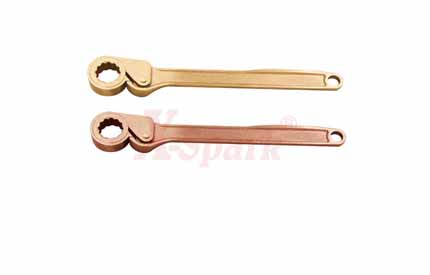Explosion-Proof Tool Suppliers will share this article about explosion-proof tools with you.
1. All tools should be cleaned of oil stains on the surface before use. After use, they should be wiped clean of oil stains and deposits on the surface. They should be stored in a dry place and isolated from corrosive objects. They should be stored without applying appropriate lubricants for a long time.
2. Wrench tools are not allowed to be used excessively, nor can they be used to extend the arm of force with casing or binding other metal rods, and to strike with a hammer (except for striking wrenches), so as to avoid breaking and deformation due to overload and affecting normal use. When using tools, you should choose their varieties and specifications reasonably according to your needs. Do not replace small ones with large ones, let alone use them as steel tools. It should be pointed out that when using adjustable wrenches, pipe wrenches, and open wrenches, pay attention to the force direction requirements, and do not twist arbitrarily. When using bladed tools, first determine the hardness of the workpiece itself, when the hardness is lower than the tool. It can be operated when the hardness is higher than the hardness of the tool, it is prohibited to use. When the workpiece is tightened by motor, semi-permanently fixed or corroded, and no other measures are taken before using the hand tool, it should be prohibited to use it to avoid damage to the tool.

3. Cutting edge tools should be placed in the sink and lightly touch the grinding wheel for sharpening. Do not use excessive force and contact the grinding wheel for too long.
4. When percussion tools are used in rock operations, the workplace they are in contact with must be floated with water before they can be operated. Operate all kinds of explosion-proof tools carefully before and after use, handle them with care, and don't throw them anywhere on the rock or cement floor.
5. Copper alloy explosion-proof tools are high-strength and corrosion-resistant in most flammable gases. However, it is not corrosion resistant under all conditions. For example, in wet ammonia, acetylene, certain ammonium salts, fluorine, chlorine, chromium, ammonium, and certain dichromate media, the degree of corrosion is quite large. Some mediums will react chemically after contact with copper alloys, generating dangerous explosive substances, such as acetylene and copper compounding to form copper acetylene. Therefore, when using explosion-proof tools, try to use them in a dry environment as much as possible. If it is impossible to avoid using them in a humid environment, speed up the operation as much as possible, reduce the working time, and prevent the risk of greater corrosion.
6. The explosion-proof tool is a special safety tool, which is made of copper-based multi-element non-ferrous metal. Some products are specially designed. Therefore, there are certain requirements for usage, maintenance, storage, and transportation. Only by fully understanding, choosing reasonably, using, and keeping it correctly, can it give full play to its various performance advantages.
7. After the explosion-proof tools are stopped, they should be wiped clean at any time. Those not in use within half a year should be oiled or preserved with the anti-corrosion method, and those not used for more than one year should be oiled and stored in a generation or box. Naturally, some parts of used tools are worn or damaged, especially tools with blades, which can be trimmed in non-hazardous places. If it is severely damaged and worn and it is not suitable to repair it by yourself, it should be scrapped.
It is important to keep in mind that non-sparking tools are not as strong as steel tools. For this reason, they wear out more quickly depending on the working environment and the care given to maintain them. It is highly recommended to carry out exhaustive maintenance of your tools in order to extend their life. Take into consideration the following advice:
- Choose the right size for the right task to prevent the tool from falling.
- Avoid contact with corrosive products such as ferrous or other contaminants that may affect non-sparking properties.
- Clean the non-sparking tool after use in order to avoid deterioration.
- Never use your non-sparking tools in environments with acetylene as it can cause explosive acetylides.
- Non-sparking tools that are likely to wear such as hammers or striking wrenches should be checked frequently.
We are an explosion-proof tools supplier. If you are interested in our products, please contact us now!
Previous: Hebei Brand Online Promation